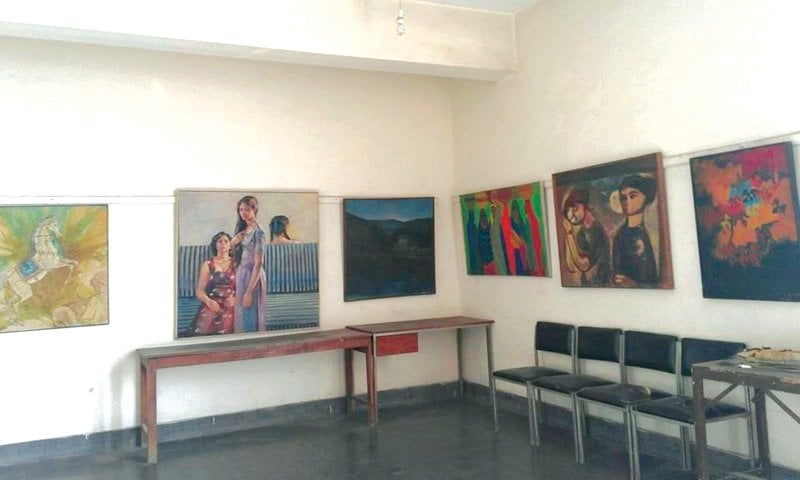
Caught between neglect and a property dispute, the Abasin Arts Council (AAC) Khyber-Pakhtunkhwa is fast falling apart. Once touted as a patron of literature and the arts, it has steadily lost ground.
With deteriorating law and order, and the absence of adequate funding from the provincial government, it has been reduced to a largely inactive body. Over time, it has become even more difficult to host art and music classes on the premises which lie centrally in the city.
When it was founded on October 14, 1955 by the commissioner of Peshawar Mussarrat Husain Zuberi, it would have been difficult to imagine the forum would have such a bleak future. For many years after, the AAC played a pivotal role in training artists and musicians.

(Above) The gallery bears a deserted look. (Below) The entrance sign for Abasin Arts Council. PHOTOS: HIDAYAT KHAN/EXPRESS
“Many big names in the field of art and literature from K-P have been affiliated with the forum,” says Mushtaq Shabab, honorary secretary of the AAC. “Ahmad Faraz, Qalandar Momand or Ismail Gulgee—all these writers and artists were given a break by the AAC.”
The arts council was initially housed in a two-room space in Peshawar cantonment. In 1956, the AAC was shifted near Peshawar Museum. It was here that the council began holding art exhibitions and classes. One of the first exhibitions held at the gallery showcased the work of Ustad Allah Bakhsh and a Chinese artist.
In 1988, the arts council took another leap of faith when it was shifted to its current location in Nishtar Hall where it continued to provide a platform for emerging talent.
Hard times
The changing times and sociopolitical landscape have not favoured the council. In its heyday, the AAC used to award money to some of the best Urdu, Pashto and Hindko writers. With time, the prize money has been reduced to only Rs7,000 – a paltry sum compared to the vast amount allocated to the initiative in the past.
Although the AAC has been registered under the Societies Registration Act 1860 to promote art and literature, it has not received sufficient funding from the government. “We just don’t have funds to organise activities in the same way as we did in the past,” explains Shabab, unable to hide the apprehension in his voice. “The government does not provide us with the required finances as it once did.”
Since 1974, the government has been required to set up arts councils at the national, provincial and district levels. However, the K-P government has repeatedly struggled to achieve this goal. And it has failed to establish arts councils at the district level.
This lack of concern hasn’t always been justifiable. It was reported some years ago that a minister refused to provide funds to the arts council because of a personal grudge.
At loggerheads
Recently, the AAC has locked horns over a long-standing property dispute with the directorate of culture. The latter set up its office at Nishtar Hall and took control of the entire building.
“The AAC is now restricted to a few rooms on the second floor,” says the secretary. “The hall is mostly being used for political gatherings. We have to wait for several weeks if we want to hold any cultural events.”
According to Shabab, most of the land in the area—originally was set aside to promote culture activities—has been taken over by the judicial complex which is located at a walking distance from Nishtar Hall.
Ironically, the issue has remained in court for many years. Although lower courts ruled in AAC’s favour, the provincial government has repeatedly challenged the decision in the upper courts. The Peshawar High Court has asked both parties to arbitrate the matter amongst themselves.
In support
Restricted to just a few rooms and some paintings on the walls, the arts council seems to have lost its charm.
“Abasin Arts Council has helped promote art and literature in the province,” says Naseeruddin Mohmand, a senior artist in the city who has been affiliated with AAC for many years. “It has helped many artists stand on their own feet. Now, as the council is going through a difficult time, it is time for us to return the favour.”
Mohmand has requested the government to take steps to help the arts council climb out of its current predicament and ensure it continues to promote art and literature in the province.
Published in The Express Tribune, February 2rd, 2015.

1717587923-0/jake-paul-vs-mike-tyson-(1)1717587923-0-165x106.webp)


1725443747-0/Untitled-design-(5)1725443747-0-165x106.webp)






COMMENTS
Comments are moderated and generally will be posted if they are on-topic and not abusive.
For more information, please see our Comments FAQ